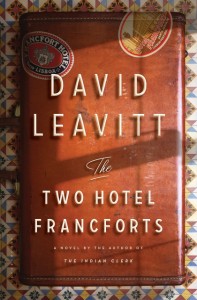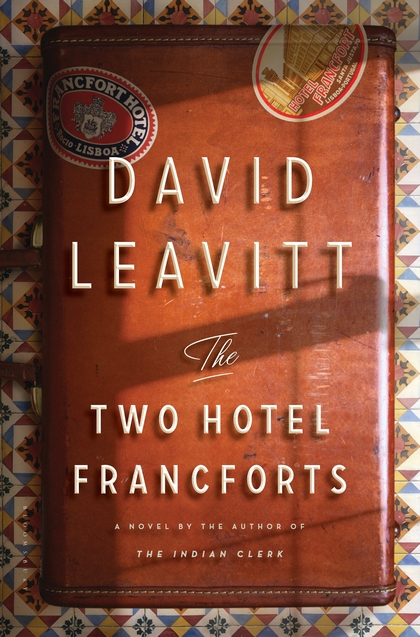 The Two Hotel Francforts
The Two Hotel Francforts
by David Leavitt
Bloomsbury. 272 pages, $25
THIS SEDUCTIVE NOVEL follows two couples in 1940 Lisbon as they await an ocean liner for America that will enable them to escape Nazi-occupied Europe with war closing in. As they kill time by exploring the city and having leisurely discussions in their favorite cafés, relationships are formed, secrets are revealed, and calamities are sown.
Pete and Julia Winters encounter Edward and Iris Freleng seemingly by chance, and the two couples strike up a friendship. Pete and Julia have just fled from Paris, where they’ve been living for fifteen years. According to Pete, who narrates the novel, Julia’s life was nearly perfect, having fled her overbearing, upper-middle-class, German-Jewish family in New York City in order to live comfortably in Paris, her dream since childhood. Pete makes that possible, having left America only to make Julia happy, and having bought a Buick dealership in Paris with help from his more ambitious and successful brother. Despite all this, he remarks, “she was never satisfied, my Julia. I always supposed I was the piece that didn’t fit.” Julia had left Paris only reluctantly, and now has no desire to return to America, fearing that her family will judge her years in Paris a failure.
Edward and Iris, on the other hand, seem blissfully happy to have landed in Lisbon. They are nomads, constantly wandering the globe in search of interesting experiences, much of it recorded in the mystery novels they write. Cosmopolitan and sophisticated, full of witty remarks, their only concern is their elderly dog Daisy, who travels with them everywhere. With her “gay tail” that, according to Edward, indicates she is not a pure-bred fox terrier, she accompanies them on their explorations of the city.
Their life seems perfect, but there are hints of hidden troubles under the surface. In the couples’ tour of the city, while searching for interesting restaurants to try for dinner, Edward always acts as the tour guide, surprisingly knowledgeable for having been in Portugal for only a little over a week. It may go without saying that all four characters are hiding something, including Pete. At the novel’s start, Pete and Julia discuss with Edward and Iris how they renovated their apartment before it was profiled in Vogue. They worry about the fate of their interior decorator, who is Jewish. Pete almost adds the word “queer” but thinks better of it. While the dialogue engages and convinces, the real pleasure lies in watching the secrets begin to unravel underneath the seemingly inconsequential café chats.
As the novel progresses, Edward’s relationship with Pete takes a sexual and romantic turn. Through a conversation with Iris, Pete discovers Edward’s past, which is full of mental illness and frustrated desire. They reach an arrangement whereby the men can spend the afternoons together so long as they always join the women for dinner. Pete’s feelings about this affair are decidedly mixed. While he clearly enjoys the experience and finds himself extremely fond of Edward, he feels incredibly guilty about Julia. In addition, he doesn’t fully trust Iris, and even Edward’s behavior can sometimes make him uncomfortable, such as when he leaves him asleep alone in a brothel.
The title refers to two hotels, one swanky, the other sleazy, owned by brothers quarreling with each other, each insisting that his hotel is the “real” Francfort. Somehow this situation is appropriate to the story, full of ambiguities and uncertainties. By the end, the novel takes a surprising turn, and Pete makes a completely unexpected decision that is perhaps the best choice he has ever made. With crisp prose and dialogue, Leavitt tells an engaging, layered tale.
________________________________________________________
Charles Green is a writer based in Annapolis, Maryland.






